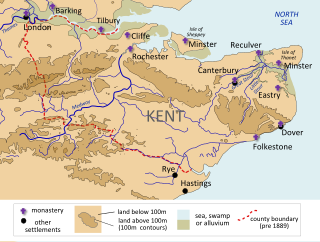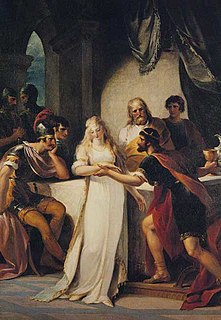
Ambrosius Aurelianus was a war leader of the Romano-British who won an important battle against the Anglo-Saxons in the 5th century, according to Gildas. He also appeared independently in the legends of the Britons, beginning with the 9th-century Historia Brittonum. Eventually, he was transformed by Geoffrey of Monmouth into the uncle of King Arthur, the brother of Arthur's father Uther Pendragon, as a ruler who precedes and predeceases them both. He also appears as a young prophet who meets the tyrant Vortigern; in this guise, he was later transformed into the wizard Merlin.
Æthelberht was King of Kent from about 589 until his death. The eighth-century monk Bede, in his Ecclesiastical History of the English People, lists him as the third king to hold imperium over other Anglo-Saxon kingdoms. In the late ninth century Anglo-Saxon Chronicle, he is referred to as a bretwalda, or "Britain-ruler". He was the first English king to convert to Christianity.

Hengist and Horsa are Germanic brothers said to have led the Angles, Saxons and Jutes in their invasion of Britain in the 5th century. Tradition lists Hengist as the first of the Jutish kings of Kent.

English mythology is the collection of myths that have emerged throughout the history of England, sometimes being elaborated upon by successive generations, and at other times being rejected and replaced by other explanatory narratives. These narratives consist of folk traditions developed in England after the Norman Conquest, integrated with traditions from Anglo-Saxon mythology, Christian mythology, and Celtic mythology. Elements of the Matter of Britain, Welsh mythology and Cornish mythology which relate directly to England are included, such as the foundation myth of Brutus of Troy and the Arthurian legends, but these are combined with narratives from the Matter of England and traditions from English folklore.

Uther Pendragon (Brittonic), also known as King Uther, was a legendary King of the Britons in sub-Roman Britain. Uther was also the father of King Arthur.

Vortigern, also spelled Vortiger, Vortigan, Voertigern and Vortigen, was a 5th-century warlord in Britain, known perhaps as a king of the Britons or at least connoted as such in the writings of Bede and Gildas. His existence is contested by scholars and information about him is obscure.

The Kingdom of the Kentish, today referred to as the Kingdom of Kent, was an early medieval kingdom in what is now South East England. It existed from either the fifth or the sixth century AD until it was fully absorbed into the Kingdom of Wessex in the late 9th century and later into the Kingdom of England in the early 10th century.
The Treason of the Long Knives is an account of a massacre of British Celtic chieftains by Anglo-Saxon soldiers at a peace conference on Salisbury Plain in the 5th century. The story is thought to be pseudohistorical as the only surviving records mentioning it are centuries later in the semi-mythological histories of the Historia Brittonum and the Historia Regum Britanniae. Though a popular cautionary tale in medieval Europe, there is no other historical evidence for The Treason of the Long Knives. Most historians interpret the story as a purely literary construction.
Octa was an Anglo-Saxon King of Kent during the 6th century. Sources disagree on his relationship to the other kings in his line; he may have been the son of Hengist or Oisc, and may have been the father of Oisc or Eormenric. The dates of his reign are unclear, but he may have ruled from 512 to 534 or from 516 to 540. Despite his shadowy recorded history Octa made an impact on the Britons, who describe his deeds in several sources.

The Battle of Aylesford or Epsford was a battle between Britons and Anglo-Saxons recorded in the Anglo-Saxon Chronicle and the Historia Brittonum. Both sources concur that it involved the Anglo-Saxon leaders Hengist and Horsa on one side and the family of Vortigern on the other, but neither says who won the battle. It was fought near Æglesthrep, presumed to be Aylesford, in Kent.

Pegwell Bay is a shallow inlet in the English Channel coast astride the estuary of the River Stour north of Sandwich Bay, between Ramsgate and Sandwich in Kent. Part of the bay is a nature reserve, with seashore habitats including mudflats and salt marsh with migrating waders and wildfowl. The public can access the nature reserve via Pegwell Bay Country Park, which is off the A256 Ramsgate to Dover road.
Hengist, King of Kent, or The Mayor of Quinborough is a Jacobean stage play by Thomas Middleton of the 1610s, but first published in 1661. It is his only overtly historical play. It was read by Pepys.

Ebbsfleet is a hamlet near Ramsgate, Kent, at the head of Pegwell Bay. Historically it was a peninsula on the southern coast of the Isle of Thanet, marking the eastern end of the Wantsum Channel that separated Thanet from the Kentish mainland. It is in the civil parish of Minster-in-Thanet.
Vortigern and Rowena, or Vortigern, an Historical Play, is a play that was touted as a newly discovered work by William Shakespeare when it first appeared in 1796. It was eventually revealed to be a Shakespeare hoax, the product of prominent forger William Henry Ireland. Its first performance was on 2 April 1796, when it was ridiculed by the audience. Its titular protagonists, Vortigern and Rowena, are figures from Britain's traditional history.

Tonge is a village near Sittingbourne in Kent, England. The hamlet is north of Bapchild, close to Murston Marshes beside the Swale.
Eldol was Consul or Count of Gloucester in Geoffrey of Monmouth's circa 1136 work Historia Regum Britanniae. In this pseudohistory he was the sole British leader to escape from the massacre of Salisbury, to which Hengist had invited all of the British Leaders to a peace treaty. When all of the leaders were there, about 460 in number, Hengest ordered his men to draw their long knives and kill every leader. Vortigern was spared, but every other ruler was slain, save Eldol, who grabbed a stick up off the ground and killed 70 men in his escape.

Rowena in the Matter of Britain was the daughter of the purported Anglo-Saxon chief Hengist and wife of Vortigern, "King of the Britons". Presented as a beautiful femme fatale, she won her people the Kingdom of Kent through her treacherous seduction of Vortigern. Contemporary sources are nearly non-existent, so it is impossible to know if she actually existed.

The white horse of Kent known colloquially as the white horse rampant is a symbol of the county of Kent, in south-east England. The heraldic image is correctly blazoned as Gules, a stallion forcené argent.
Events from the 5th century in England.

The white dragon is a symbol associated in Welsh mythology with the Anglo-Saxons.












